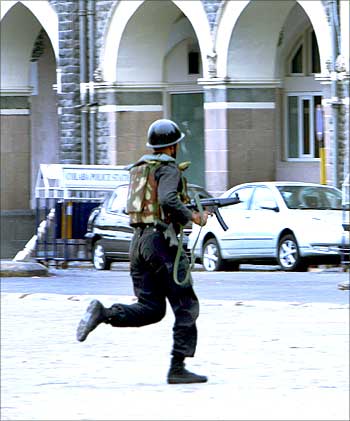 Arthur J Pais reports from New York on two documentaries on the 26/11 attacks.
Arthur J Pais reports from New York on two documentaries on the 26/11 attacks.
"The siege of Mumbai is such a dramatic and complex subject that many filmmakers can work and come up with very different kind of films," says Victoria Pitt whose 50 minute-long documentary The Secrets of Death: Mumbai Massacre premiers next week on America's Public Broadcasting Corporation.
While her film focuses on the courage and resourcefulness of hostages, Terror in Mumbai, the HBO documentary, running over an hour, features exclusive audio tapes of the intercepted phone calls between the young jihadis and their minders in Pakistan, and testimony from the sole surviving gunman.
Terror in Mumbai premieres on November 19; Mumbai Massacre on November 25; both will be shown worldwide and have multiple screenings.
While Pitt is based in Australia, Dan Reed, the director of Terror lives in London.
"One of the most disturbing facets of this story is how easily such low-tech attacks could be duplicated anywhere, including the US," he says.
"Hopefully, other governments can learn from the Mumbai experience and plan a coordinated response."
Reed's credits as a writer, director and producer include HBO's Terror in Moscow, which details the 2002 ordeal in which Chechen terrorists took more than 700 people hostage in a Moscow opera theatre.
An Indian perspective is brought to the Reed documentary by journalist, editor and historian, the best-selling writer Fareed Zakaria, who was born and raised in Mumbai.
'Much as the 9/11 attacks in the US did in 2001, the events that unfolded last November in Mumbai served as a terrifying wake-up call, not just to India but to the rest of the world,' says Dr Zakaria who appears on camera in the opening and closing of the film.
Zakaria's mother, journalist Fatma Zakaria, had an office at the Taj Mahal hotel, one of the prime targets of the terrorists.
The attack, he continues 'broadened the spectrum of our enemies and brought attention to the number of different terrorist groups that exist, who may be bigger and better organised than we ever imagined.'
'The fact that a small group of gunmen was able to inflict so much pain, and the government of the second most populous nation on earth was unable to stop them for three days, should change our sense of the dangers out there.'
Reed says Terror in Mumbai offers a vivid and harrowing picture 'through interviews with survivors and Indian police officers, archival news coverage, extensive video surveillance footage of the terrorists in action, and chilling audio excerpts of cell-phone conversations intercepted by security forces.'
The phone intercepts, according to the press notes, 'provide a grotesque running commentary as the controllers, watching events unfold on live TV, direct the gunmen, telling them where the security forces are, which of their hostages should be killed and how to do it. With the killers wounded and asking what to do next, the tapes reveal the controllers calmly urging them to fight to the death and not allow themselves to be taken alive.'
Zakaria seeks to give the film a global perspective. 'Much as the 9/11 attacks in the US did in 2001, the events that unfolded last November in Mumbai served as a terrifying wake-up call, not just to India but to the rest of the world,' he says.
He said the film 'takes us inside the mind of a terrorist.'
'It does that because of a combination of good intelligence and sheer luck. You see, the Indian intelligence service had managed to sell some SIM cards, some phone cards, Lashkar-e-Tayiba, the terror group responsible for perpetrating the Mumbai attacks. The intelligence service was hoping to listen in on phone calls made by members of this up and coming terror organisation, which is a sworn enemy of India.'
'Of the 10 Pakistanis who went to Mumbai on this terror mission, nine were killed. That was what was supposed to happen. They were told to go to Mumbai, kill as many people as they could, and die in the process themselves.'
Image: A commando in action during the terror attack at the Taj Mahal hotel. Photograph: Sanjay Sawant.






 © 2025
© 2025